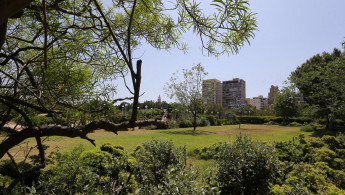After four-year campaign, activists get Beirut's 'Central Park' reopened
After four-year campaign, activists get Beirut's 'Central Park' reopened
Feature: Beirut's largest park reopened in September, for the first time in decades, in a notable victory for activists campaigning for more public space in the highly developed capital.
3 min read
The 30 hectares of pine forest are Beirut's answer to Central Park [AFP]
Amid escalating anti-government protests triggered by an ongoing refuse crisis, some good news came from Beirut last weekend.
Closed for 25 years, Horsh Beirut, Lebanon's largest municipal public space, reopened after a four-year campaign succeeded in persuading Beirut's governor, Ziad Chebib, to reopen it.
Closed for 25 years, Horsh Beirut, Lebanon's largest municipal public space, reopened after a four-year campaign succeeded in persuading Beirut's governor, Ziad Chebib, to reopen it.
The park had been closed to the Lebanese public, although foreigners, especially Western expats, have been allowed to enter. The pretext the authorities gave for the park's continued closure was that the public would dump rubbish in it or use it for illicit activities.
There were also claims the sensitive location of the park between Shia and Sunni districts of the capital would transform it into a hotspot for sectarian tensions.
| Some claimed the location of the park between Shia and Sunni districts would make it a hotspot for sectarian tension |
Horsh Beirut will now open once a week on Saturday, but the governor has reportedly promised to gradually increase its opening days and eventually fully reopen it.
The main group behind the campaign was Nahnoo, Arabic for "We".
"We feel proud that finally it's open, but of course it's not enough, we are still waiting for it to open totally. We hope this will happen in the coming months," Mohammad Ayoun, director of Nahnoo, told Lebanese English-language newspaper The Daily Star.
Horsh Beirut, also known as Horsh El Snoubar ["The Pine Forest"], is located on the southern outskirts of Beirut, and is the remnant of an ancient, much larger forest. Today it covers approximately 300,000 square metres, down from 800,000 square metres in 1967.
A public debate on private space
Its re-opening takes place amid a growing debate over public spaces in the city, many of which have been privatised or are at risk of being sold to profit-seeking private concerns.
Ayoub said the gradual approach was to allow the municipality of Beirut to make preparations for large numbers of visitors to use the park.
The park needs many upgrades and repairs to bring it up to an acceptable standard, it is thought.
Last year, the smaller Sanayeh park re-opened after receiving a $2.5 million makeover from a private association. In a country plagued by chronic budget deficits and a lack of public space, this raised hopes that something similar could be done with Horsh Beirut.
| The park needs a lot of work to bring it up to an acceptable standard |
Many posted pictures of themselves relaxing in the park with friends and enjoying the greenery, which is becoming increasingly rare in the highly developed metropolis.
Several people wrote on social media that the re-opening of the park proved that if the Lebanese put enough pressure on the authorities, they would listen and change their approach.
On the reopening of the park on Saturday, activists volunteered to help visitors, many of whom were visiting the park for the first time in their lives.
Repeated fires, some caused by fighting during the civil war and bombing by Israeli jets during the 1982 invasion, have been blamed for the reduction in the park's size.



